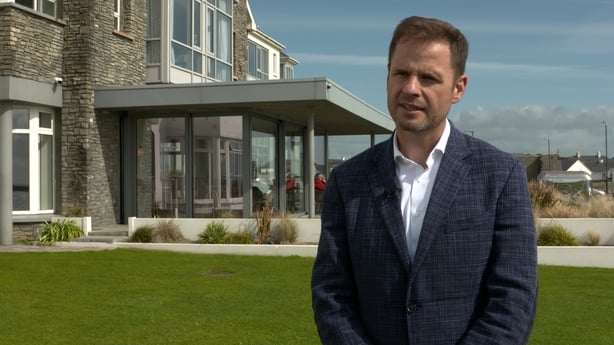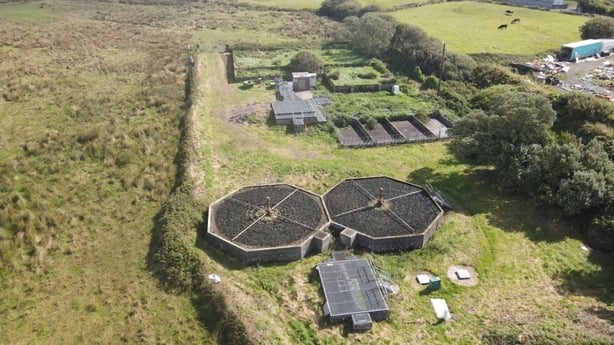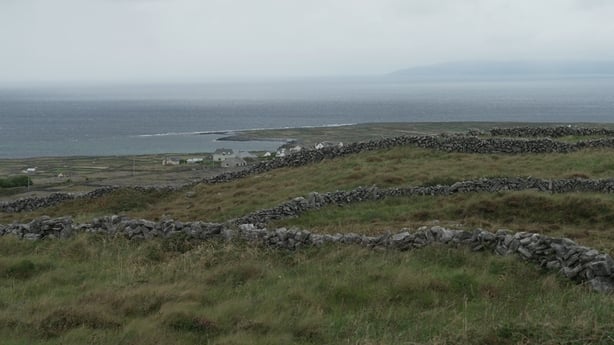An internal Uisce Éireann document says it will take "in excess of 40 years" to complete capital works on wastewater treatment infrastructure which are required to meet its statutory obligations, under Irish and EU law.
The Uisce Éireann timeframe is contained in a document seen by Prime Time.
This does not compare well with the official position of the Environmental Protection Agency (EPA) and government.
For example, it is double the rough estimate for such work recently published by the Environmental Protection Agency (EPA).
In its annual Urban Wastewater Treatment report (2023) published last Friday, the EPA stated that "based on Uisce Éireann's estimates, it will take more than two decades to complete all the necessary improvements".
In response to the EPA report, Uisce Éireann did not give an explicit timeframe, stating only that a "multi-billion euro investment" was required "over many decades to achieve necessary standards".
The internal Uisce Éireann document also appears to conflict with the government’s goal of restoring water quality in our rivers and lakes by 2027.
READ: EPA audits flag pollution concerns from drinking water plants
The recently published 'Water Action Plan 2024’ cites wastewater discharges as one of our main pollution problems and seeks to bring our internal water bodies to good ecological standard by 2027 to meet Ireland’s obligations under the EU Water Framework Directive.
However, the extended timeframe internally acknowledged by Uisce Éireann for bringing our water infrastructure up to standard will not surprise many.
For example, in its annual reports on wastewater, the EPA repeatedly states that Uisce Éireann’s pace of progress "is far too slow" and speaks of "excessive delays" in improving water quality.
In its report last week the EPA, for example, stated at 27 of the 34 priority areas where wastewater improvements are "most urgently needed to protect our environment," Uisce Éireann has not yet started works.
The Commission for the Regulation of Utilities (CRU) also recently criticised Uisce Éireann for missing more than half the tasks it was assigned in its last funding round.
In response, Uisce Éireann says it is "making strong progress in addressing priority issues following decades of under-investment".
It highlights how "raw sewage discharges have been now eliminated in 41 of 50 areas".
It also stated that "of the wastewater treatment plants, which are subject to Urban Wastewater Treatment Directive, 94% are compliant".
WATCH: Uisce Éireann document: 'Wastewater fixes will take 40 years'
Local issues
For people with localised pollution problems delays in fixing our wastewater infrastructure are hard to accept.
John Burke is owner and manager of the Armada Hotel at Spanish Point Co Clare.
He says there is a contrast between the way Uisce Éireann fails to maintain its overloaded wastewater treatment plant at Miltown Malbay, and what the local authority expects of his private wastewater system.
"The contradiction is that as a private enterprise, we're managed and monitored to that finest degree as we should be, but yet a public facility is discharging to a level that just is not acceptable," he says.
The EPA prosecuted Uisce Éireann for its failure to carry out upgrading works on the Miltown Malbay plant, but it is yet to commence them.
Yet run-off from the malfunctioning plant which is frequently flooded enters the Leagard stream which runs into a local beauty spot.
The shoreline at Spanish Point, just beneath the Armada hotel, is a Special Area of Conservation – to protect coastal springs & marine life there – which today is polluted by the Leagard stream.
"The stream runs alongside of the property. It's finding its way into the bay ultimately. The condition of the stream is not natural and that is very visible," according to Mr Burke.

The Leagard stream currently has an EPA "red dot" status, indicating serious pollution.
As result of the wastewater affected stream, John Burke says he has huge concerns about the future of the blue flag status of the beach at Spanish Point, due to Uisce Éireann’s failure to act.
"All the public infrastructure has progressed in this nation, except for some reason wastewater treatment and public water infrastructure, it's not acceptable."
In a recent site visit in August, EPA reports show that the required works still have not happened. For this reason, the EPA says it is currently considering "what further action it may take against Uisce Éireann" in relation to plant.
In a statement Uisce Éireann (UE) stated that Miltown Malbay is not on the EPA’s ‘Priority Action List’ which it uses as "the key driver of wastewater investment priorities".

Wastewater systems in rural settings with smaller wintertime populations and huge surges in the winter suffer similar neglect.
On the iconic Aran island Inís Mór, locals have similar concerns.
75% of the island is a Special Area of Conservation and Bord Fáilte recently announced that it is to build a new interpretative centre on the island, to accommodate a quarter of a million tourists that visit the island annually.
Yet for almost two decades locals have complained about the poor treatment of sewage from the public toilets at Kilronan pier, where the majority of those tourists arrive each summer.
The toilets’ wastewater discharges into a field which adjoins a lake in a nearby Special Area of Conservation (SAC).
Locals like Joe O’Flaherty have noticed the lake’s decline.
"You can see for yourself, there's no wildlife here. It's just sludge, pure sludge, look. It's just plain to see... If you look at what's listed in the SAC, that's not here anymore," he told Prime Time.
In 2017, a HSE Environmental officer described conditions at the field where the wastewater from the public toilets and local cottages – the wastewater of which is also the responsibility of Uisce Éireann - discharge as "a serious public health issue".
After years of discussion, in 2023 Uisce Éireann promised to address the issue. It says it is currently fixing the existing septic tank into which toilets discharge, and regularly de-sludges it.
But Mr O'Flaherty says it is not bringing a noticeable improvement.
"The islanders are trying to take care of the island, the government don't: they're not even enforcing the law. They're on about habitats - and all they're looking at is bringing in more tourists. The facilities aren't here for them. There's not basic needs here. I mean, you don't have wastewater."
While visiting the island, in late September, Prime Time took a water sample from the lake in the Special Conservation Area and had it tested. There were roughly one hundred visitors on the island that day.
Analysis of that sample indicated that there was no presence of effluent that day, but it had very high readings for the Chemical Oxygen Demand (COD) and phosphates, indicating high levels of chemicals.

According to Professor Fiona Regan of the DCU Water Institute, the readings indicate the possible presence of detergents, household chemicals or industrial cleaning chemicals amounting to "a pollution incident".
"It can lead to the biodiversity of that entire system being affected. I would be really concerned," Prof. Regan said.
Local activist, Kevin O’Hara, who has been corresponding with Uisce Éireann and other agencies on behalf of residents, says the lack of progress in addressing the pollution is very disappointing.
"It's just so hard to take that the state is actively participating in this pollution. And at the same time then the same environmental rules are being used to stop people applying for planning in the local area."
Uisce Éireann has told Prime Time that it has commenced working on a long-term solution for the wastewater works.
"These works will take some time due to the level of assessment, design and statutory consents required," according to its statement.
In recent legal correspondence to the Friends of the Irish Environment who are threatening to take legal action against Uisce Éireannn on the pollution, the timeline was made specific.
UE states "these wastewater works will take at least 8+ years from commencement" after assessments are completed later this year. It notes they are subject to financial approval.







